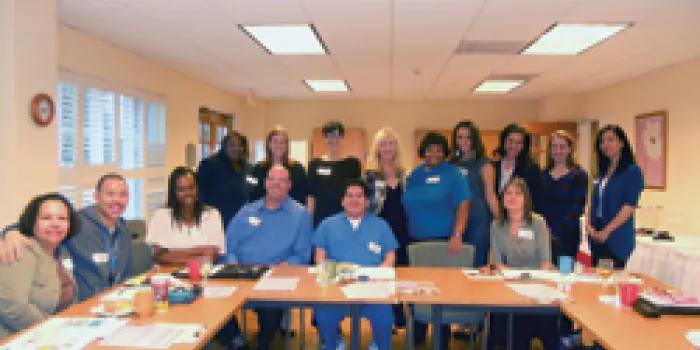Approximately 15 social workers from Los Angeles–area hospitals gathered in January at the Hemophilia Foundation of Southern California (HFSC) Social Workers Forum to learn about issues critical to people with bleeding disorders. The event was the brainchild of HFSC executive director Linda Corrente, who feels it is imperative that providers are educated about the needs of people with hemophilia and von Willebrand disease (VWD).
The forum included a session on community resources for people with bleeding disorders, given by HFSC’s staff social worker. It also featured sessions about setting up Individualized Education Program and 504 plans for children with bleeding disorders, and navigating psychosocial issues in families with special needs children.
Corrente stressed that it is important for all area hospital providers to be informed about bleeding disorders, because many patients in southern California receive medical care from community hospitals, not hemophilia treatment centers (HTCs). Many patients are insured by Kaiser Permanente, an HMO, she explained, whose facilities do not offer the comprehensive care model available at HTCs. “Patients are treated by a hematologist or oncologist, much like when a patient goes to a community hospital or emergency room. We want to educate the social workers in those facilities, so when our patients visit these hospitals, the staff knows how to help them.”
Although Corrente was pleased with the positive response from forum participants, she plans to increase future attendance by offering continuing education units for social workers. “A future item on my wish list is to provide bleeding disorder awareness and training for emergency room staff in community hospitals,” she says.
Corrente believes in providing educational opportunities for providers not associated with HTCs. During the past three years, HFSC has trained 300 school nurses from the Los Angeles Unified School District about bleeding disorders.
In August the chapter will host an all-day meeting for 600 school nurses. (See The Vital Role of School Nurses.) That training will include an overview of bleeding disorders, signs and symptoms of VWD disease, and NHF’s Victory for Women program.
“The nurses have really enjoyed this training, because many of them were unfamiliar with bleeding disorders,” Corrente says. “They learned new ways to treat the nosebleeds that can happen with hemophilia and VWD. They heard firsthand the parents’ challenges with setting up a school plan for a child with a bleeding disorder.”
The trainings have also raised bleeding disorders awareness. “We get more calls from school nurses now, asking us for information and resources,” Corrente explains. In a few cases, families who were unaware of HFSC were referred to the chapter by school nurses.
Corrente hopes HFSC’s education-al outreach will become a trend. Better treatments have resulted in people living more active lives. “People with hemophilia go to regular hospitals,” she says. “All school kids go to the school nurse.” She feels it is imperative that HFSC facilitate the education of these providers as much as it can. “We have great networks within our community,” Corrente says. “It’s time we reach out to the wider world.”

